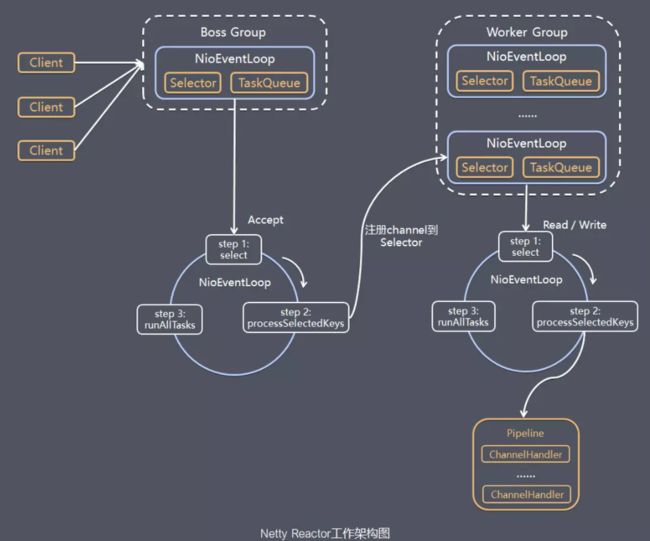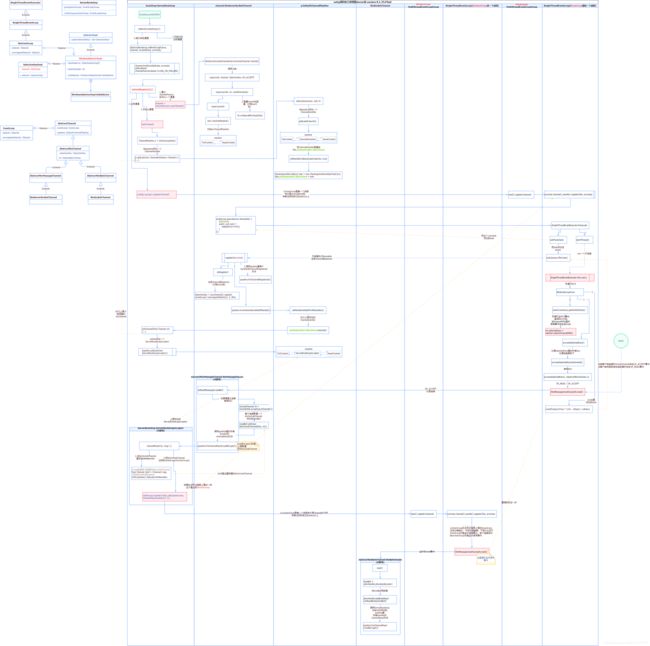2.netty源码分析,从实例分析netty源码执行流程
前言
学习netty源码前需要熟悉nio的执行流程,netty就是对nio的封装和优化,netty的部分代码会用到和nio一样的代码。熟悉nio的执行流程:https://blog.csdn.net/qq_33743572/article/details/110209722
框架源码大多不简单,许多代码前后呼应,仅凭看代码很难把有些框架的逻辑理清楚,需要画图才能清晰。
此篇着重从图看代码,我是一边看代码一边画的,看完后重复看了好几遍修改了好几遍。
netty的源码没有spring的那么模块化,初学者一定要有耐心看,一边看代码一边看图或自己画图,我也是看了一个星期才整理完成。
只画了server端的图,client端相差不多。
大神如果发现有问题也请指教,或者加我一起探讨。
netty简介
netty是jboss提供的一个java开源的网络编程框架,特点是异步、nio、事件驱动。是对nio的封装优化,因为java原生nio代码不友好。
netty的介绍网上很多。此篇专注源码流程。
netty线程模型
两个NioEventLoop:BossGroup和WorkerGroup,就是下面实例NettyServer里bootstrap.group(bossGroup, workerGroup)的那两个。也是两个线程。NioEventLoopGroup是管理NioEventLoop周期的线程池。
BossGroup负责监听处理客户端连接。WorkerGroup负责监听读、写。这两个NioEventLoop里有各自的selector,负责循环监听事件。
BossGroup和WorkerGroup是netty对nio的优化,nio只有一个selector监听连接和读、写事件,而netty让BossGroup专门监听连接事件,这样可以同时支持更高的并发连接。
再了解几个netty的组件:
Channel:通道。负责建立连接、io。
Selector:选择器。是channel的注册中心。channel与selector建立连接,selector监听channe的事件(网络连接、读、写)。每次注册的时候生成一个selectionKey(channel+selector),放在Selector的数组里。
Buffer:缓冲区。发送方先将数据写到缓冲区,再将缓冲区交给线程。
ChannelHandler:通道处理器。在连接、读、写的时候做些操作,有点类似拦截器。
ChannelPipeline:ChannelHandler的责任链,每个channel都有自己的pipeline。
接下来看实例
实例代码:
实例也可从我github上下载:https://github.com/chendaliu/architectCourse/tree/master/nettyDemo/src/main/java/com/czl/netty/base
maven依赖:
io.netty netty-all 4.1.35.Final
1.NettyServer.java
package com.czl.netty.base;
import io.netty.bootstrap.ServerBootstrap;
import io.netty.channel.ChannelFuture;
import io.netty.channel.ChannelInitializer;
import io.netty.channel.ChannelOption;
import io.netty.channel.EventLoopGroup;
import io.netty.channel.nio.NioEventLoopGroup;
import io.netty.channel.socket.SocketChannel;
import io.netty.channel.socket.nio.NioServerSocketChannel;
public class NettyServer {
public static void main(String[] args) throws Exception {
//创建两个线程组bossGroup和workerGroup, 含有的子线程NioEventLoop的个数默认为cpu核数的两倍
// bossGroup只是处理连接请求 ,真正的和客户端业务处理,会交给workerGroup完成
EventLoopGroup bossGroup = new NioEventLoopGroup();
EventLoopGroup workerGroup = new NioEventLoopGroup();
try {
//创建服务器端的启动对象
ServerBootstrap bootstrap = new ServerBootstrap();
//使用链式编程来配置参数
bootstrap.group(bossGroup, workerGroup) //设置两个线程组
.channel(NioServerSocketChannel.class) //使用NioServerSocketChannel作为服务器的通道实现
// 初始化服务器连接队列大小,服务端处理客户端连接请求是顺序处理的,所以同一时间只能处理一个客户端连接。
// 多个客户端同时来的时候,服务端将不能处理的客户端连接请求放在队列中等待处理
.option(ChannelOption.SO_BACKLOG, 1024)
.childHandler(new ChannelInitializer() {//创建通道初始化对象,设置初始化参数
@Override
protected void initChannel(SocketChannel ch) throws Exception {
//对workerGroup的SocketChannel设置处理器
ch.pipeline().addLast(new NettyServerHandler());
}
});
System.out.println("netty server start。。");
//绑定一个端口并且同步, 生成了一个ChannelFuture异步对象,通过isDone()等方法可以判断异步事件的执行情况
//启动服务器(并绑定端口),bind是异步操作,sync方法是等待异步操作执行完毕
ChannelFuture cf = bootstrap.bind(9000).sync();
//给cf注册监听器,监听我们关心的事件
//对通道关闭进行监听,closeFuture是异步操作,监听通道关闭
// 通过sync方法同步等待通道关闭处理完毕,这里会阻塞等待通道关闭完成
cf.channel().closeFuture().sync();
} finally {
bossGroup.shutdownGracefully();
workerGroup.shutdownGracefully();
}
}
} 2.NettyServerHandler.java
package com.czl.netty.base;
import io.netty.buffer.ByteBuf;
import io.netty.buffer.Unpooled;
import io.netty.channel.ChannelHandlerContext;
import io.netty.channel.ChannelInboundHandlerAdapter;
import io.netty.util.CharsetUtil;
/**
* 自定义Handler需要继承netty规定好的某个HandlerAdapter(规范)
*/
public class NettyServerHandler extends ChannelInboundHandlerAdapter {
/**
* 读取客户端发送的数据
*
* @param ctx 上下文对象, 含有通道channel,管道pipeline
* @param msg 就是客户端发送的数据
* @throws Exception
*/
@Override
public void channelRead(ChannelHandlerContext ctx, Object msg) throws Exception {
System.out.println("服务器读取线程 " + Thread.currentThread().getName());
//Channel channel = ctx.channel();
//ChannelPipeline pipeline = ctx.pipeline(); //本质是一个双向链接, 出站入站
//将 msg 转成一个 ByteBuf,类似NIO 的 ByteBuffer
ByteBuf buf = (ByteBuf) msg;
System.out.println("客户端发送消息是:" + buf.toString(CharsetUtil.UTF_8));
}
/**
* 数据读取完毕处理方法
*
* @param ctx
* @throws Exception
*/
@Override
public void channelReadComplete(ChannelHandlerContext ctx) throws Exception {
ByteBuf buf = Unpooled.copiedBuffer("HelloClient".getBytes(CharsetUtil.UTF_8));
ctx.writeAndFlush(buf);
}
/**
* 处理异常, 一般是需要关闭通道
*
* @param ctx
* @param cause
* @throws Exception
*/
@Override
public void exceptionCaught(ChannelHandlerContext ctx, Throwable cause) throws Exception {
ctx.close();
}
}3.NettyClient.java
package com.czl.netty.base;
import io.netty.bootstrap.Bootstrap;
import io.netty.channel.ChannelFuture;
import io.netty.channel.ChannelInitializer;
import io.netty.channel.EventLoopGroup;
import io.netty.channel.nio.NioEventLoopGroup;
import io.netty.channel.socket.SocketChannel;
import io.netty.channel.socket.nio.NioSocketChannel;
public class NettyClient {
public static void main(String[] args) throws Exception {
//客户端需要一个事件循环组
EventLoopGroup group = new NioEventLoopGroup();
try {
//创建客户端启动对象
//注意客户端使用的不是ServerBootstrap而是Bootstrap
Bootstrap bootstrap = new Bootstrap();
//设置相关参数
bootstrap.group(group) //设置线程组
.channel(NioSocketChannel.class) // 使用NioSocketChannel作为客户端的通道实现
.handler(new ChannelInitializer() {
@Override
protected void initChannel(SocketChannel ch) throws Exception {
//加入处理器
ch.pipeline().addLast(new NettyClientHandler());
}
});
System.out.println("netty client start。。");
//启动客户端去连接服务器端
ChannelFuture cf = bootstrap.connect("127.0.0.1", 9000).sync();
//对通道关闭进行监听
cf.channel().closeFuture().sync();
} finally {
group.shutdownGracefully();
}
}
} 4.NettyClientHandler.java
package com.czl.netty.base;
import io.netty.buffer.ByteBuf;
import io.netty.buffer.Unpooled;
import io.netty.channel.ChannelHandlerContext;
import io.netty.channel.ChannelInboundHandlerAdapter;
import io.netty.util.CharsetUtil;
public class NettyClientHandler extends ChannelInboundHandlerAdapter {
/**
* 当客户端连接服务器完成就会触发该方法
*
* @param ctx
* @throws Exception
*/
@Override
public void channelActive(ChannelHandlerContext ctx) throws Exception {
ByteBuf buf = Unpooled.copiedBuffer("HelloServer".getBytes(CharsetUtil.UTF_8));
ctx.writeAndFlush(buf);
}
//当通道有读取事件时会触发,即服务端发送数据给客户端
@Override
public void channelRead(ChannelHandlerContext ctx, Object msg) throws Exception {
ByteBuf buf = (ByteBuf) msg;
System.out.println("收到服务端的消息:" + buf.toString(CharsetUtil.UTF_8));
System.out.println("服务端的地址: " + ctx.channel().remoteAddress());
}
@Override
public void exceptionCaught(ChannelHandlerContext ctx, Throwable cause) throws Exception {
cause.printStackTrace();
ctx.close();
}
}跑起实例
1.先把NettyServer跑起来,输出如下说明server启动成功:
netty server start。。
2.把NettyClient跑起来
服务端输出如下:
- 服务器读取线程 nioEventLoopGroup-3-1
- 客户端发送消息是:HelloServer
- 服务器读取线程 nioEventLoopGroup-3-2
- 客户端发送消息是:HelloServer
说明client和server连接成功。
源码跟踪
停掉服务,开启debug。
从NettyServer的 ChannelFuture cf = bootstrap.bind(9000).sync() 这一行开始断点调试,进入bind方法后,执行流程如下图:
原图地址:https://www.jianguoyun.com/p/DR0I9J0QqKrvCBiyic4D

